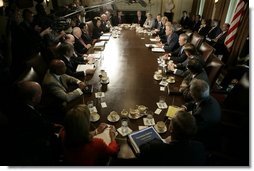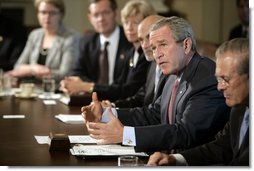
- Afghanistan
- Africa
- Budget Management
- Defense
- Economy
- Education
- Energy
- Environment
- Global Diplomacy
- Health Care
- Homeland Security
- Immigration
- International Trade
- Iraq
- Judicial Nominations
- Middle East
- National Security
- Veterans
|
Home >
News & Policies >
September 2005
|
For Immediate Release
Office of the Press Secretary
September 19, 2005
President Meets with Homeland Security Council
Cabinet Room
10:25 A.M. EDT
THE PRESIDENT: I just met with my Homeland Security Council to discuss ongoing relief efforts in the areas affected by Hurricane Katrina. I have made it clear that I believe it's a national security matter for people to review emergency plans. And so, therefore, I've instructed Secretary Chertoff and the folks around this table to work with our local counterparts to make sure that we've got emergency plans in place that will deal with significant disaster. And for the local folks, I urge them to cooperate in a review of these plans. It's important.
 Secondly, one of the things that I heard loud and clear on my travels down
there was that people are concerned about red tape. And one of the big
concerns for the mayors and the Governor of Mississippi, in particular, and
the mayors along the Gulf Coast, was this issue about debris removal --
who's responsible, how can we get it done in an effective way. And I want to thank the Secretary for working with Governor Barbour on this issue to expedite a process by which we can start getting some of this debris removed from a part of our country that was just wiped out by this storm; I mean, there are piles and piles of homes and buildings just in rubble. And in order to help this region get rebuilt, first things first, and that's to get rid of the debris. And so we've got a plan in place to cut through the red tape and get this done in an effective way.
Secondly, one of the things that I heard loud and clear on my travels down
there was that people are concerned about red tape. And one of the big
concerns for the mayors and the Governor of Mississippi, in particular, and
the mayors along the Gulf Coast, was this issue about debris removal --
who's responsible, how can we get it done in an effective way. And I want to thank the Secretary for working with Governor Barbour on this issue to expedite a process by which we can start getting some of this debris removed from a part of our country that was just wiped out by this storm; I mean, there are piles and piles of homes and buildings just in rubble. And in order to help this region get rebuilt, first things first, and that's to get rid of the debris. And so we've got a plan in place to cut through the red tape and get this done in an effective way.
On another matter, a couple of other matters, one, I want to congratulate the people of Afghanistan for showing up at the polls and defying the Taliban and those who threaten their lives and say, look, you know, these people supported democracy. It's just another step on their road toward a stable democracy and we congratulate them.
And, as well, I want to welcome the comments of the OPEC and non-OPEC nations, talking about making sure they get enough supply on the markets to help hopefully affect the world price of crude oil. I have been concerned about the price at the pump that our folks are paying. Part of that was caused by the disruptions of Hurricane Katrina. We dealt with that by suspending rules and regulations that enable us to import more gasoline. But part of the cost of gasoline is a result of high crude oil prices, and one way to affect those prices is to conserve, and the other way is to encourage an increased supply. And so I want to thank those countries that are trying to figure out how to get more supply on the market to help relieve some of the pressure.
Be glad to answer some questions. Jennifer.
Q Thank you, sir. Thank you. Mayor Nagin in New Orleans has invited people to start returning to that city, when there are lots of federal officials who feel that it's not safe to do so. Do you feel like you need to step in?
THE PRESIDENT: Well, we have made our position very clear. Admiral Allen has made the position very clear of this government, and that is that we share the goal of the Mayor, but we have got concerns. There are environmental concerns, which Administrator Johnson shared with us today.
 Let me give you a real concern that I think everybody ought to pay
attention to, and that is this Tropical Storm Rita, which now looks like
it's going to head out into the Gulf, and could track Katrina, or it could
head further to the west. But, nevertheless, there is deep concern about
this storm causing more flooding in New Orleans.
Let me give you a real concern that I think everybody ought to pay
attention to, and that is this Tropical Storm Rita, which now looks like
it's going to head out into the Gulf, and could track Katrina, or it could
head further to the west. But, nevertheless, there is deep concern about
this storm causing more flooding in New Orleans.
And so Admiral Allen has reflected our -- the concerns of this administration. And we want to work with the Mayor. The Mayor is working hard. The Mayor has got this dream about having a city up and running. And we share that dream. But we also want to be realistic about some of the hurdles and obstacles that we all confront in repopulating New Orleans.
Q Will you express that concern yourself to the Mayor?
THE PRESIDENT: Well, I just did. But, as well, absolutely. Secretary -- "Secretary," I call -- Andy Card, former Secretary, and now Chief of Staff Card is reaching out to him -- has reached out to him earlier. But, listen, Admiral Allen is our man on the ground. Admiral Allen speaks for the administration. He is -- and the Mayor knows our position. But I repeat, and the Mayor needs to hear, and so do the people of New Orleans, our objective -- listen, I went there, and stood in Jackson Square to say, we want this city to reemerge. As I said, I can't imagine America without a vibrant New Orleans. It's just a matter of timing, and there's issues to be dealt with. If it were to rain a lot, there is concern from the Army Corps of Engineers that the levees might break. And so, therefore, we're cautious about encouraging people to return at this moment of history.
Adam.
Q Thank you, Mr. President. Given what you've said in the past about North Korea's record of noncompliance, what makes you think that this time North Korea will abandon its pursuit of nuclear weapons?
THE PRESIDENT: Five nations, in working with North Korea, have come up with a formula which we all hope works. Five nations have spoken and said it is not in the world's interest that North Korea have a nuclear weapon. And now there's a way forward. And part of the way forward is for the North Koreans to understand that we're serious about this, and that we expect there to be a verifiable process. In other words, they have said, in principle, that they will abandon their weapons programs. And what we have said is, great, that's a wonderful step forward, but now we've got to verify whether or not that happens.
It was a positive step yesterday. It was a step forward in making this world a more secure place. And I want to thank our other partners in the six-party dialogue, you know, by working together. The question is, over time, will all parties adhere to the agreement.
Thank you.
END 10:32 A.M. EDT


